|  | |
 |
| The end of an extraordinary year | As we approach the holidays and the end of 2022, I want to offer my best wishes to you and your loved ones for a safe and joyful holiday season and success in the new year. I’ve had the opportunity to act as interim Executive Vice President for Health Affairs (EVPHA) over the past several months. Serving the Woodruff Health Sciences Center (WHSC) and Emory University at this level has been both enlightening and inspirational. This unique perspective has deepened my appreciation for our remarkable people and our programs in WHSC.
Together, since the summer, we have faced and weathered the AMC closure, continuing financial challenges and labor shortages, inflation, Epic conversion, elections, social media events, and the direct and indirect impacts of COVID-19, influenza, and RSV. And yet, we have continued to provide extraordinary care recognized by many national and international ranking systems as among the finest in the world, shattered our own research funding record for a second consecutive year, opened three new facilities for research and education, demonstrated to national reviewers the strength of our programs, and continued to attract and educate the brightest and most diverse students from across the world. We have also strengthened our partnerships with Grady, Children’s, CDC, the VA, and others in Atlanta and Georgia.
As we look forward to 2023 and a new era of growth and excellence under incoming EVPHA Dr. Ravi Thadani, I am optimistic with a heightened sense of purpose that we can continue to deliver on our promise of improving lives and providing hope for all the people we serve.
I’m grateful to you for making 2022 an outstanding year, and I believe that 2023 will be a bright year for us all.
Please direct questions and comments to evphafeedback@emory.edu.
David S. Stephens, MD
Interim Executive Vice President for Health Affairs
Interim Executive Director of the Woodruff Health Sciences Center | |
| |
|  | Centralized core facilities | HSRB-II will house a host of integrated core facilities, putting state-of-the-art technologies at the fingertips of the scientists who will be working in the building.
“Core facilities provide cutting edge technologies to collaboratively support impactful research. Equipment in cores is generally not found in an individual lab since it is either too expensive or difficult to maintain” says Adam Marcus, interim vice president for research in the WHSC and interim associate dean for novel technology and research cores within the School of Medicine (SOM). “Instead of having an individual lab house and maintain a state-of-the-art cell sorter, for example, we would have one or multiple top-of-the-line models in an accessible location with administrative and scientific oversight.”
Emory Integrated Core Facilities that will be located in HSRB-II include the Center for Systems Imaging, Flow Cytometry (including BSL3 equipment), Cellular Imaging, Gnotobiotic Animal, Mouse Transgenic & Gene Targeting, Rodent Behavioral, Genomics, and Metabolomics & Lipidomics Cores, as well as a new Biorepository Core. There will also be resources, space, and operations for the Division of Animal Resources, and BSL-3 studies. For some cores, HSRB-II will be one of multiple locations on campus while others will relocate to have a single location at HSRB-II.
Three cores, called Innovation Cores, will be new to the Emory system—3D Bioprinting, Micromachining, and Extended Reality. 3D bioprinting is similar to 3D printing, but instead of using resins, it uses cells as building blocks. Micromachining allows researchers to take advantage of microchip technologies to make small devices that allow biological experiments to be done on a much smaller scale, which is relevant in the human body. The Extended Reality Core, which will combine aspects of virtual reality and augmented reality, is still in the planning stages.
“A lot of the technologies in these innovation cores are available in engineering research labs,” says Wilbur Lam, W. Paul Bowers Research Chair in the Department of Pediatrics and professor in the Wallace H. Coulter Department of Biomedical Engineering. “We are doing what no medical school has ever done—making this technology available to our medical researchers as well as to our entire scientific community.” | |
| |
|  | | Helping patients with heritable high cholesterol | Emory Heart & Vascular Center physicians are joining forces with the Family Heart Foundation to find and treat undiagnosed patients living with a common genetic condition that causes very high levels of unhealthy cholesterol. The condition, called familial hypercholesterolemia (FH), is one of the most common genetic causes of early heart attacks and premature coronary heart disease, yet it is dramatically underdiagnosed. The new initiative, called Emory FIND FH (Flag, Identify, Network and Deliver FH), will analyze health data of existing patients within the Emory Healthcare system and flag individuals suspected of having FH. Once identified, patients and their primary care provider will be contacted about further evaluation and tailored follow-up care. Read more.
| | |
| | | 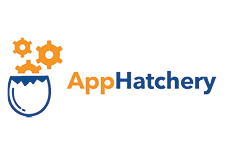 | | App Improves Detection of Heart Defects in Newborns | While pulse oximetry screening, which can detect critical congenital heart defects (CCHD) in newborns, is easy to perform, interpreting the results can be challenging. In 2012, researchers at Emory and Children’s Healthcare of Atlanta developed the Pulse Ox Tool, an app for smart phones that automates the test. Since its inception, Pulse Ox has been shown to lead to earlier diagnosis and, in turn, improved survival for children with CCHD. Now, researchers at the App Hatchery have retooled the app to further expedite the screening process and potentially lead to other important diagnoses beyond CCHD. The latest version of the tool includes an updated algorithm to account for the latest newborn screening guidelines, improved usability, and wider availability across various mobile devices.
| | |
|
| |
|  | | New initiative advances Emory climate change research and teaching | The Emory Climate Research Initiative, established by Provost Ravi Bellamkonda and formally launched this month, draws together faculty with diverse expertise to advance climate-related research and curricula across the institution, focusing on areas where Emory can make unique contributions to humanity’s efforts to understand and mitigate the impacts of climate change. Read more.
| | |
| | | 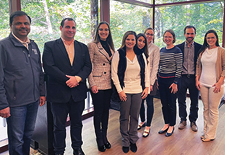 | | Helping Latin American oncologists improve clinical practice in their countries | Early and mid-career oncologists from Latin America participated in the first two sessions of Winship’s new Preceptorship for Breast/Lung Oncologists aimed at increasing their knowledge and skills to improve their clinical practice back home. Funded by Pfizer, the two-week deep-immersion programs brought a total of nine physicians to Atlanta from Brazil, Argentina, Mexico, and Colombia. Read more.
| | |
|
| |
| 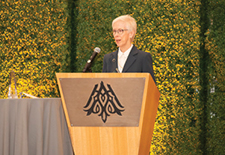 | | Pappas receives Hospital Hero Award | The Georgia Hospital Association (GHA) presented Sharon Pappas, chief nurse executive of Emory Healthcare, with the prestigious Hospital Hero Award for her outstanding contributions to the health care field, particularly the field of nursing. Pappas was one of five individuals to receive the statewide award this year. Read more.
| | |
| | | 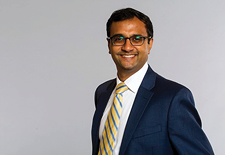 | | Winship designated gold-level Cardio-Oncology Center of Excellence | The International Cardio-Oncology Society has designated Winship a gold-level Cardio-Oncology Center of Excellence, one of fewer than 35 gold-level centers worldwide, for its expertise in the early detection, prevention and treatment of cardiac diseases in patients with cancer. Anant Mandawat is the director of Winship's Cardio-Oncology Clinic.
| | |
|
| |
| 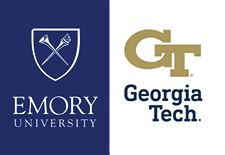 | | Developing tools to assess effects of heat exposure on farmworkers | Researchers from Emory and Georgia Tech are developing a multi-sensor biopatch for farmworkers that can predict symptoms of heat-related illness, dehydration, and acute kidney injury and generate warnings in real time. “Heat-related illness and dehydration are particularly insidious as they can quickly progress from moderate discomfort to confusion and impaired judgment,” says Vicki Hertzberg, prinicipal investigator on the project and an SON professor. “A hand-held device with clear information about heat illness will help farmworkers know when to seek help.” Read more.
| | |
| | |  | | Black women have worst HR+/HER2- breast cancer outcomes | Findings of a large, global clinical trial led by senior author Kevin Kalinsky, director of the Glenn Family Breast Center at Winship, found that non-Hispanic Black women with hormone receptor (HR) positive/HER2 negative breast cancer, with one to three involved lymph nodes and recurrence scores below 25, have worse outcomes than non-Hispanic White women with similar diagnosis. HR+/HER2- is the most common subtype of breast cancer, accounting for some 68 percent of the estimated 287,850 new cases diagnosed each year. Read more.
| | |
|
| |
| 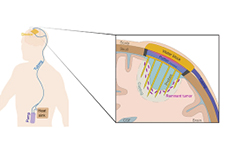 | | Cooling glioblastoma to room temperature extends survival in preclinical study | A new preclinical study recently reported in Science Advances, co-led by Emory bioengineer and neuroscientist Ravi V. Bellamkonda, suggests that cooling brain tumors to room temperature may extend survival of patients with glioblastoma multiforme. "Cytostatic hypothermia," which locally and continuously cools the brain tumor without harming surrounding healthy tissue, is able to prolong the survival of rats with brain tumors. Read more.
| | |
| | |  | | Firearms deaths reaching unprecedented levels | Firearm-related violence and suicides have been on the rise since the start of the COVID-19 pandemic, but a new study published in JAMA Network Open is the first analysis to show both the sheer magnitude of firearm fatalities in the US over the past 32 years and the growing disparities by race/ethnicity, age, and geographic location. While fatalities began a steady increase in 2005, the upward trajectory has accelerated in recent years with a 20 percent increase from 2019-2021. Read more.
| | |
|
| |
| | 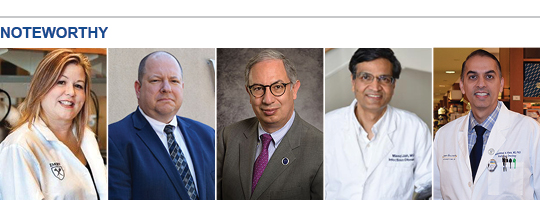 | | Dana Boyd Barr, professor of environmental health, was elected as a Fellow of the Collegium Ramazzini, an independent, international academy founded in 1982 with the mission to advance knowledge of occupational and environmental health, prevent disease, and save lives.
Aaron Brammer, clinical administrator in the Department of Radiation Oncology, has been named chair of the board for the Society for Radiation Oncology Administrators.
Carlos del Rio, executive associate dean of SOM and Grady Health System, has been honored by US Senator Jon Ossoff for outstanding service to Georgia and the nation in the Official Congressional Record. Read more.
Manoj Jain, an adjunct professor at SOM and RSPH, has been named the inaugural recipient of the Jeffrey P. Koplan Global Health Award. Read more.
Mohammad Khan, radiation oncologist, has been selected to become a fellow of the American College of Radiology. | |
| |
|

